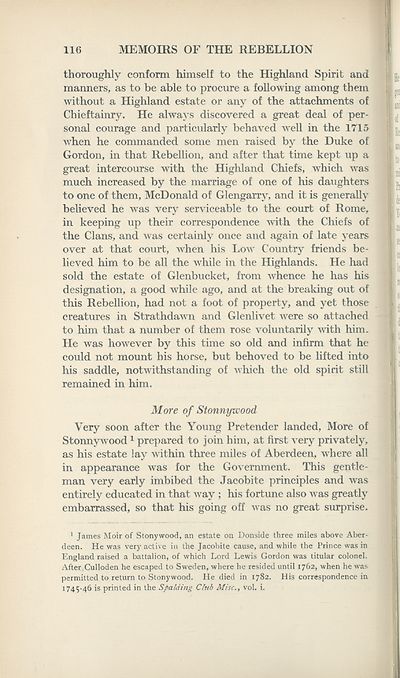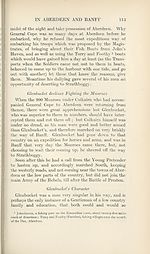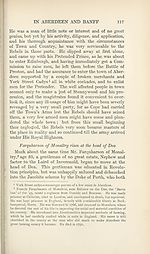Series 2 > Origins of the 'Forty-five
(213) Page 116
Download files
Complete book:
Individual page:
Thumbnail gallery: Grid view | List view

116
MEMOIRS OF THE REBELLION
thoroughly conform himself to the Highland Spirit and
manners, as to be able to procure a following among them
without a Highland estate or any of the attachments of
Chieftainry. He always discovered a great deal of per¬
sonal courage and particularly behaved well in the 1715
when he commanded some men raised by the Duke of
Gordon, in that Rebellion, and after that time kept up a
great intercourse with the Highland Chiefs, which was
much increased by the marriage of one of his daughters
to one of them, McDonald of Glengarry, and it is generally
believed he was very serviceable to the court of Rome,
in keeping up their correspondence with the Chiefs of
the Clans, and was certainly once and again of late years
over at that court, when his Low Country friends be¬
lieved him to be all the while in the Highlands. He had
sold the estate of Glenbucket, from whence he has his
designation, a good while ago, and at the breaking out of
this Rebellion, had not a foot of property, and yet those
creatures in Strathdawn and Glenlivet were so attached
to him that a number of them rose voluntarily with him.
He was however by this time so old and infirm that he
could not mount his horse, but behoved to be lifted into
his saddle, notwithstanding of which the old spirit still
remained in him.
More of Stonnywood
Very soon after the Young Pretender landed, More of
Stonnywood 1 prqjared to join him, at first very privately,
as his estate lay within three miles of Aberdeen, where all
in appearance was for the Government. This gentle¬
man very early imbibed the Jacobite principles and was
entirely educated in that way ; his fortune also was greatly
embarrassed, so that his going off was no great surprise.
1 James Moir of Stonywood, an estate on Donside three miles above Aber¬
deen. He was very active in the Jacobite cause, and while the Prince was in
England raised a battalion, of which Lord Lewis Gordon was titular colonel.
After Culloden he escaped to Sweden, where he resided until 1762, when he was
permitted to return to Stonywood. He died in 1782. His correspondence in
1745-46 is printed in the Spalding Chib Misc., vol. i.
MEMOIRS OF THE REBELLION
thoroughly conform himself to the Highland Spirit and
manners, as to be able to procure a following among them
without a Highland estate or any of the attachments of
Chieftainry. He always discovered a great deal of per¬
sonal courage and particularly behaved well in the 1715
when he commanded some men raised by the Duke of
Gordon, in that Rebellion, and after that time kept up a
great intercourse with the Highland Chiefs, which was
much increased by the marriage of one of his daughters
to one of them, McDonald of Glengarry, and it is generally
believed he was very serviceable to the court of Rome,
in keeping up their correspondence with the Chiefs of
the Clans, and was certainly once and again of late years
over at that court, when his Low Country friends be¬
lieved him to be all the while in the Highlands. He had
sold the estate of Glenbucket, from whence he has his
designation, a good while ago, and at the breaking out of
this Rebellion, had not a foot of property, and yet those
creatures in Strathdawn and Glenlivet were so attached
to him that a number of them rose voluntarily with him.
He was however by this time so old and infirm that he
could not mount his horse, but behoved to be lifted into
his saddle, notwithstanding of which the old spirit still
remained in him.
More of Stonnywood
Very soon after the Young Pretender landed, More of
Stonnywood 1 prqjared to join him, at first very privately,
as his estate lay within three miles of Aberdeen, where all
in appearance was for the Government. This gentle¬
man very early imbibed the Jacobite principles and was
entirely educated in that way ; his fortune also was greatly
embarrassed, so that his going off was no great surprise.
1 James Moir of Stonywood, an estate on Donside three miles above Aber¬
deen. He was very active in the Jacobite cause, and while the Prince was in
England raised a battalion, of which Lord Lewis Gordon was titular colonel.
After Culloden he escaped to Sweden, where he resided until 1762, when he was
permitted to return to Stonywood. He died in 1782. His correspondence in
1745-46 is printed in the Spalding Chib Misc., vol. i.
Set display mode to:
![]() Universal Viewer |
Universal Viewer | ![]() Mirador |
Large image | Transcription
Mirador |
Large image | Transcription
Images and transcriptions on this page, including medium image downloads, may be used under the Creative Commons Attribution 4.0 International Licence unless otherwise stated. ![]()
| Scottish History Society volumes > Series 2 > Origins of the 'Forty-five > (213) Page 116 |
|---|
| Permanent URL | https://digital.nls.uk/126861747 |
|---|
| Attribution and copyright: |
|
|---|
| Description | Over 180 volumes, published by the Scottish History Society, containing original sources on Scotland's history and people. With a wide range of subjects, the books collectively cover all periods from the 12th to 20th centuries, and reflect changing trends in Scottish history. Sources are accompanied by scholarly interpretation, references and bibliographies. Volumes are usually published annually, and more digitised volumes will be added as they become available. |
|---|


